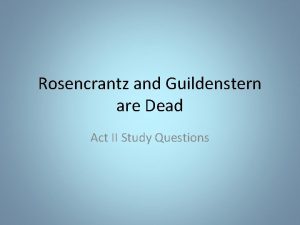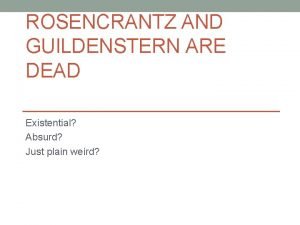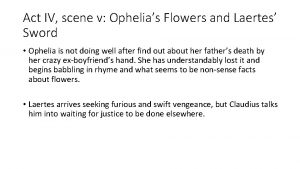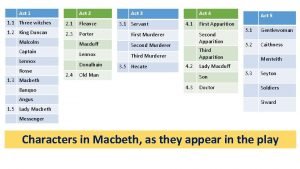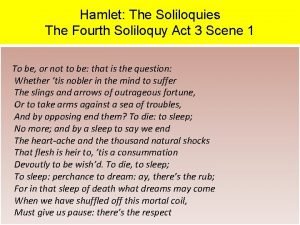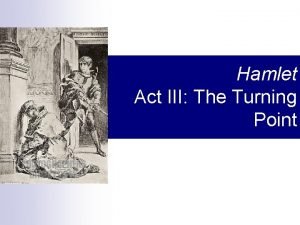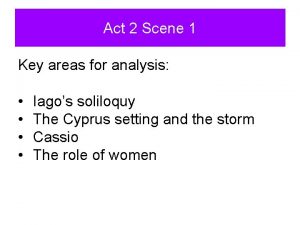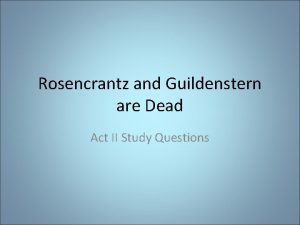Hamlet Act IV i Claudius Rosencrantz Guildenstern hear























































- Slides: 55

Hamlet Act IV, i

• Claudius, Rosencrantz & Guildenstern hear Gertrude crying/sighing and go to see what is the matter with her. • Gertrude asks Rosencrantz & Guildenstern to leave so she and Claudius can be alone. Claudius then asks about Hamlet.

• Gertrude tells Claudius that Hamlet is mad. “Mad as the sea and wind when both contend/Which is mightier!” IV, i, 7 -8 (page 192)

• Gertrude explains to Claudius that in a fit of madness Hamlet murdered Polonius.

Claudius to Gertrude “It had been so with us, had we been there. /His liberty is full of threats to all, /To yourself, to us, to everyone. ” IV, i, 13 -15 (page 192

• Claudius says that Hamlet would have killed anyone who was hiding behind the tapestry at that time. • Claudius says that he and Gertrude will be held responsible for this since they knew Hamlet was acting crazy and hadn’t done anything about it. • Claudius tells Gertrude that Hamlet will be sent away.

• Claudius calls Rosencrantz & Guildenstern back into the room and tells them that Hamlet has murdered Polonius • Claudius wants to know where Hamlet is and Gertrude says he has taken the body somewhere.

• Claudius tells Gertrude that he will call a council meeting to tell of what Hamlet has done and to dispel any gossip or slanderous rumors that he and Gertrude might be a target for.

• It is important to note that the only aspect of Polonius’ death that Claudius is worried about is that he or Gertrude might be blamed for it. • He makes no mention of how their father’s death will affect Ophelia or Laertes

IV, ii

• Hamlet hides Polonius’ body and will not tell Rosencrantz & Guildenstern where it is. • Hamlet is again hiding behind his façade of madness. At this point there is little strategic benefit to be gained from the mask of madness, since it may be hard to deceive Claudius about his motives.

• Hamlet gets digs in at Rosencrantz & Guildenstern when he calls them “sponges” just doing everything that the king is telling them to do. • Hamlet runs from them as if playing hide and seek and tells them to bring him to the king.

IV, iii

• Claudius acts as a practical man, seeking a pragmatic solution to his problems. • He says that Hamlet must be restrained, but they have to do this carefully because the people of Denmark love Hamlet.

• Claudius is going to make it seem to the people like this trip to England was planned for awhile. • Rosencrantz & Guildenstern say they have caught Hamlet but he will not disclose where Polonius’ body is. • Hamlet is led in and questioned by Claudius.

• Claudius has to ask Hamlet several times where Polonius is. • Hamlet has several answers. • He eventually tells Claudius that Polonius’ body is in the lobby.

• Claudius says everything is ready for Hamlet’s departure for England. • Claudius says that Hamlet has to go right away. • Hamlet replies by saying “Good”.

• When Hamlet leaves and Claudius is left alone, he discloses his own pragmatic solution: once abroad, Hamlet will be killed by the King of England. • He requested this in a letter.

IV, iv

• Fortinbras is leading his men through Denmark into battle against Poland. • This is the first physical introduction of Fortinbras. • The Captain tells Hamlet that Fortinbras is going after Poland to gain a small patch of land that is worth nothing.

In Hamlet’s final soliloquy he expresses shame because Prince Fortinbras can fight for honor over something small, like a useless piece of land, but Hamlet cannot kill Claudius to avenge the murder of his father.

• Fortinbras is a man of action, and Hamlet acknowledges this superiority. • Hamlet berates himself for his own failure to take action against Claudius.

• Fortinbras has seized control of events in his life, while Hamlet is pulled one way or another by accidents of fortune and the will of others.

• Hamlet is ashamed to see Fortinbras head an army in a cause not really worthy, while he, has taken no action against a greater wrong.

Hamlet vows to achieve the revenge which has motivated him. “O, from this time forth, /My thoughts be bloody, or be nothing worth!” IV, iv, 67 -68 (page 208)

IV, v

• Horatio and the Gentlemen plead with Gertrude to speak to Ophelia who has become distracted and irrational. • At first, Gertrude refuses to do so; she finally reluctantly agrees to see her.

• Ophelia has really gone mad. The cause of her madness can be linked to two things: Hamlet’s betrayal of her and her lover murdering her father. • With all of Polonius’ faults and the bad way he treated his daughter, he was still loved by his daughter.

• Ophelia’s only communication is through folk songs. • Claudius orders Horatio and the Gentleman to keep a close watch on her.

• Unlike Hamlet’s antic disposition this is true madness. • Hamlet’s madness is sometimes silly and funny; Ophelia’s madness is a cause for concern and pity.

• Her bawdy and racy songs hint that Hamlet and she did have an intimate relationship. • Laertes has invaded the palace with a mob and overpowered the royal guard. Laertes is accusing Claudius of Polonius’ murder. People are shouting to make Laertes their king.

• Laertes attacks Claudius and demands to know what happened to Polonius. • Gertrude is quick to defend Claudius and tell Laertes that Claudius in not the cause of Polonius’ death.

• This is an example of Laertes as a man of action. • He vows revenge as Hamlet has sworn to do, but he seems more likely to act upon it.

• Claudius tells Laertes that he didn’t murder Polonius. • Laertes sees Ophelia mad. When she sees Laertes she doesn’t recognize him. This is more fuel for Laertes’ revenge. • Laertes is highly upset by Ophelia’s state of mind.

• Claudius tells Laertes he will tell him about Polonius’ death.

IV, vi

• Horatio receives a letter from Hamlet that says pirates have captured Hamlet and let the others sail to England. • Pirates have treated Hamlet well

• The letter states that the servant also has a letter for Claudius. • Hamlet has news about Rosencrantz & Guildenstern.

• Horatio leaves to find Hamlet. • This is an interim scene meant to raise interest in what will happen next with Rosencrantz & Guildenstern and Hamlet.

IV, vii

• Claudius tells Laertes that Hamlet killed Polonius • Laertes asks Claudius why Hamlet has not been punished.

There has been no punishment for 2 reasons: 1. Gertrude—Claudius cannot disappoint her or make her sad by punishing her son 2. The public loves Hamlet and Claudius feels that if he punishes Hamlet the public will attack Claudius.

• As Claudius is telling Laertes how much he loved Polonius a messenger enters with a letter to Claudius from Hamlet. • The letter states that Hamlet will be coming home, alone, soon.

• Claudius asks Laertes if he will be ruled. • Meaning if Claudius makes it seem as if Hamlet’s death were an accident and no one could be blamed, would Laertes kill Hamlet.

Laertes “My lord, I will be ruled; /The rather, if you could devise it so/That I might be the organ. ” IV, vii, 74 -76 (page 234) • Another reference to being played

Claudius comes up with Plan A: Laertes will challenge Hamlet to a fencing match.

• Both Hamlet and Laertes are good fencers, Laertes being the better of the two. • Hamlet has been envious of Laertes’ fencing abilities since the best fencer from Normandy commented on Laertes’ ability.

• Claudius knows Hamlet’s ego could not turn down the chance to duel with Laertes. • Laertes will pick the sharp foil and since Hamlet is so generous he will not ask to inspect the foil.

• Laertes says that he will poison the tip of the sword so that even if Hamlet gets scratched with the sword he will die. • Claudius manipulates Laertes into doing this by bringing up Polonius and asking Laertes if he truly loved his father.

Plan B if Plan A fails: • Claudius will poison the wine. Hamlet might like a drink after fighting and Claudius will prepare for him poisoned wine.

• These arrangements make Hamlet’s death inevitable. • Gertrude enters the room with news of Ophelia’s drowning.

• Ophelia was sitting on a branch of a willow tree hanging flowers when the branch broke. • She fell into the water and let of the weight of her clothing drag her underwater. • She does nothing to save herself.

Is this really suicide?

• The news of Ophelia’s death fuels Laertes desire for revenge against Hamlet.

Laertes about Ophelia “Too much of water hast thou, poor Ophelia, /And therefore I forbid my tears. ” IV, vii, 204 -5 (page 242)
 Guildenstern personality
Guildenstern personality Rosencrantz and guildenstern are dead act 2
Rosencrantz and guildenstern are dead act 2 Rosencrantz and guildenstern are dead existentialism
Rosencrantz and guildenstern are dead existentialism Existentialism in rosencrantz and guildenstern are dead
Existentialism in rosencrantz and guildenstern are dead Wisdom and goodness to the vile seem vile
Wisdom and goodness to the vile seem vile What is hamlet's point in comparing rosencrantz to a sponge
What is hamlet's point in comparing rosencrantz to a sponge Hamlet: act 3, scene 3, line 87
Hamlet: act 3, scene 3, line 87 Let him who has ears hear
Let him who has ears hear Hear ye definition
Hear ye definition Claudius early life
Claudius early life B. claudius ptolemaeus
B. claudius ptolemaeus Claudius ptolemy astronomy contributions
Claudius ptolemy astronomy contributions Claudius brandt
Claudius brandt Claudius morgan
Claudius morgan Prefixe grec
Prefixe grec Claudius keizer
Claudius keizer Julius claudius dinasztia
Julius claudius dinasztia Claudius lysias
Claudius lysias Michael claudius
Michael claudius Hamlet act 4
Hamlet act 4 Michael claudius
Michael claudius Ptolemäus
Ptolemäus Claudius eisenberg
Claudius eisenberg Thomas claudius huber
Thomas claudius huber Claudius ptolemy astronomy contributions
Claudius ptolemy astronomy contributions Pumba she's gonna eat me
Pumba she's gonna eat me Why does ophelia give claudius fennel
Why does ophelia give claudius fennel Macbeth act 3-5 summary
Macbeth act 3-5 summary I dare damnation
I dare damnation Hamlet act three scene 1
Hamlet act three scene 1 Hamlet act 1 questions
Hamlet act 1 questions Act 5 scene 1 hamlet
Act 5 scene 1 hamlet Pun in hamlet
Pun in hamlet Fourth soliloquy of hamlet
Fourth soliloquy of hamlet Hamlet act 1 characters
Hamlet act 1 characters Hamlet act 2 scene 2 summary
Hamlet act 2 scene 2 summary Hamlet act 1 scene 3
Hamlet act 1 scene 3 Climax de hamlet
Climax de hamlet Hamlet act 2 scene 2 quiz
Hamlet act 2 scene 2 quiz Turning point of hamlet
Turning point of hamlet Hamlet act 3 scene 1 summary
Hamlet act 3 scene 1 summary Hamlet part 8 themes
Hamlet part 8 themes Imperial jointress
Imperial jointress Hamlet act 2 scene 2 short summary
Hamlet act 2 scene 2 short summary Act 1 scene 1 hamlet
Act 1 scene 1 hamlet Hamlet act 2 character analysis
Hamlet act 2 character analysis Setting of hamlet
Setting of hamlet Hamlet soliloquy act 2
Hamlet soliloquy act 2 Act 1 scene 3 hamlet summary
Act 1 scene 3 hamlet summary Macbeth act 2 quiz
Macbeth act 2 quiz What happens in hamlet act 2
What happens in hamlet act 2 Act 1 scene 3 hamlet
Act 1 scene 3 hamlet Act 5 summary hamlet
Act 5 summary hamlet Hubris in macbeth
Hubris in macbeth Hamlet act v
Hamlet act v Act five scene one hamlet
Act five scene one hamlet

